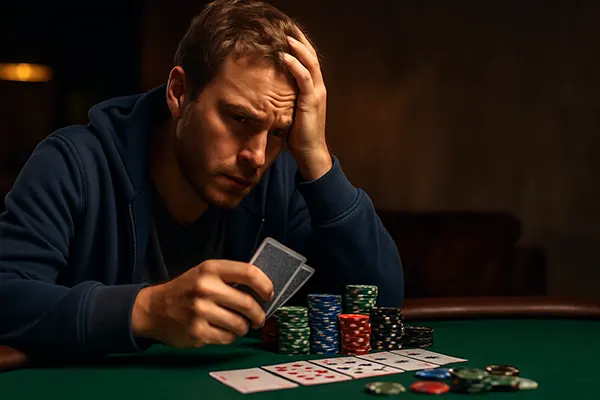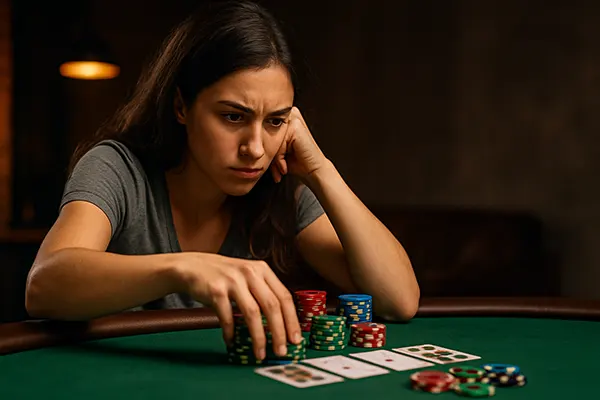
The Role of Micro-Emotions in Poker: How Subconscious States Affect Decisions (Micro-Tilt, Micro-Frustration)
Poker has long been regarded as a game of skill, logic, and patience, yet beneath the surface lies a complex psychological battlefield. Every professional player knows that emotions, no matter how small, can tip the balance between success and failure. Micro-emotions — subtle, almost imperceptible psychological reactions — often arise subconsciously during the game and directly influence decisions. Understanding how micro-tilt and micro-frustration affect one’s thought process is crucial to mastering emotional discipline at the poker table.
Understanding Micro-Emotions and Their Impact
Micro-emotions are short-lived bursts of emotion that occur in response to specific triggers, such as losing a hand, facing a bluff, or missing a draw. These reactions last only a few seconds but can subconsciously affect behaviour and decision-making. Even a minor irritation or disappointment can alter a player’s focus and make them deviate from their strategy.
For instance, a player who experiences micro-frustration after a bad beat may unconsciously start chasing losses or playing more aggressively to compensate. This is where micro-tilt begins — not as a complete loss of control, but as a subtle deviation from optimal play. Recognising these micro-reactions is the first step towards emotional mastery in poker.
Experts in behavioural psychology highlight that poker players often underestimate the frequency and power of such states. The ability to identify the early signs of micro-tilt — tightening muscles, faster breathing, or tension in the shoulders — can prevent emotional escalation and keep decisions rational.
Micro-Tilt: The Hidden Enemy of Consistency
Micro-tilt is the lightest form of emotional imbalance that affects decision-making without being openly noticeable. A player might believe they are playing logically, yet subtle frustration or self-doubt begins to alter risk perception. Over time, this leads to a series of poor choices that erode profits and confidence.
Micro-tilt can manifest in many forms: overvaluing mediocre hands, ignoring odds, or entering pots without proper calculation. Unlike full tilt, which is visible to others, micro-tilt works quietly, draining emotional energy and clouding judgment. The danger lies in its invisibility — it feels rational but leads to irrational outcomes.
To combat micro-tilt, professionals use psychological techniques such as breathing exercises, short breaks, and self-reflection between hands. Understanding that even small emotional shifts can affect long-term results allows players to manage their state and maintain peak performance.
Micro-Frustration and Decision Biases
Micro-frustration occurs when a player experiences a small emotional setback — for example, when a well-played hand still results in a loss. It’s a quiet disappointment that doesn’t show on the surface but lingers subconsciously, influencing the next few hands. Such frustration can distort risk evaluation and push players into emotional compensation mode.
One common manifestation is the “revenge play” — a subtle desire to reclaim lost chips quickly. This emotional state leads to overconfidence or excessive caution, both of which harm decision quality. Over time, micro-frustration becomes a psychological habit that disrupts a player’s strategic consistency.
Recognising this state requires self-awareness. Professional poker players train themselves to detect the earliest emotional signals, such as irritation, restlessness, or even slight impatience. By acknowledging them rather than suppressing them, they prevent the subconscious from taking control of their decisions.
Techniques to Overcome Micro-Frustration
The key to overcoming micro-frustration lies in developing emotional resilience. One effective technique is mental “resetting” — taking a few deep breaths, mentally reviewing the hand, and consciously releasing any emotional residue. This helps restore a neutral mindset before the next round.
Another strategy involves cognitive reframing — interpreting each loss not as a personal failure but as a neutral outcome within the game’s probability framework. This approach transforms frustration into information, allowing players to learn from setbacks instead of reacting impulsively.
Maintaining a pre-set routine during poker sessions also helps reduce the impact of emotional fluctuations. Structured behaviour patterns, such as consistent bet sizing and timing, act as anchors that keep the player grounded regardless of outcomes.

The Importance of Emotional Awareness in Long-Term Success
Consistent performance in poker depends not only on mathematical skills and strategic knowledge but also on psychological endurance. Emotional awareness enables players to detect internal fluctuations before they evolve into full emotional tilt. In modern professional poker, managing micro-emotions is as crucial as analysing ranges and probabilities.
Today’s elite players increasingly incorporate mindfulness and emotional regulation practices into their training. These techniques enhance concentration, reduce impulsivity, and help maintain stable decision-making across long sessions. Emotional awareness, therefore, becomes a measurable skill that separates the best from the rest.
Ignoring micro-emotions leads to cumulative mental fatigue and poor discipline over time. In contrast, players who actively monitor their internal states develop greater psychological flexibility, making them more resilient to variance and stress — the two inevitable companions of poker.
Integrating Emotional Control into Poker Strategy
Emotional control should be seen not as a separate skill but as part of a comprehensive poker strategy. Tracking emotional responses alongside game data helps identify patterns: when does micro-tilt appear, under what conditions does frustration increase, and how does it affect decision-making? This self-analysis creates a foundation for continual improvement.
Many professionals use journaling to record emotional states after each session. This process allows them to see how small emotional shifts correlate with performance fluctuations. Over time, emotional stability becomes a competitive advantage — a tool for consistent, rational play even under pressure.
Ultimately, poker mastery lies in balancing the analytical with the emotional. Recognising the power of micro-emotions and managing them with awareness and discipline transforms poker from a game of chance into a sophisticated exercise in psychological control.

